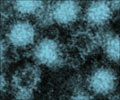A novel manner of attacking flu viruses is being explored by scientists at Rutgers University, after chemical agents that block the virus's ability to replicate itself in cell culture

Timely production of a vaccine is difficult when a pandemic flu strikes. A viable alternative is to treat with drugs.
"Right now there's really only one effective oral drug for treating influenza," said Eddy Arnold, professor of chemistry and chemical biology in the School of Arts and Sciences at Rutgers and a member of the Center for Advanced Biotechnology and Medicine. And just as bacteria develop resistance to antibiotics, Arnold notes that some flu strains have developed resistance to Tamiflu, the sole orally available anti-flu drug.
Arnold and his collaborators have been working to create drugs beyond Tamiflu, especially ones that target different parts of the virus, using an approach that helped in the development of powerful anti-AIDS drugs. By synthesizing chemical compounds that bind to metal ions in a viral enzyme, the researchers found they could halt that enzyme's ability to activate a key step in the virus's replication process.
In Arnold's words, his team's compounds "really gum up" the targeted enzyme of influenza virus.
Advertisement









